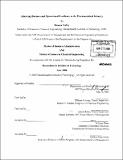Achieving business and operational excellence in the pharmaceutical industry
Author(s)
Coffey, Shonna (Shonna Marie)
DownloadFull printable version (17.60Mb)
Other Contributors
Leaders for Manufacturing Program.
Advisor
Charles Cooney and Janice Klein.
Terms of use
Metadata
Show full item recordAbstract
Historically the pharmaceutical industry has been highly profitable. However, the increasing regulatory requirements, bargaining power of buyers, and drug failures together with the threat of biosimilars and decreasing R&D productivity are creating challenges for research driven pharmaceutical companies. With future revenue growth uncertain, pharmaceutical companies must focus on cost reduction to sustain the profit margins needed to support research and development of new medicines. The lean methodology first developed by Toyota is recommended as a way to achieve operational success. A deep analysis of the current state of the pharmaceutical industry and the operational inefficiencies inherent in regulated drug production is provided. The renewed importance of operations within the pharmaceutical business model is explored through a case study of the biotechnology segment's leader, Amgen. Specifically, the design and initial rollout of the Amgen Process Excellence (APEX) initiative is studied. The APEX methodology is a six step process based on lean and six-sigma principles to guide operational improvement activities at Amgen. During the author's internship at the Rhode Island site the rollout of the APEX movement included a current state analysis of the site's financial and operational performance. As a result of this analysis, a prioritized list of improvement ideas was generated and incorporated into a future state vision for the site. Implementation of these improvement ideas is estimated to result in a reduction in cycle time by 55%, lower inventory levels, and the elimination of millions of dollars in waste. The following major conclusions were developed as a result of this work. (cont.) First, substantial improvement opportunities exist within current pharmaceutical manufacturing. Second, pharmaceutical companies must build operational efficiencies into manufacturing process design. Lastly, operational excellence cannot simply be attained through the implementation of an improvement toolkit.
Description
Thesis (M.B.A.)--Massachusetts Institute of Technology, Sloan School of Management; and, (S.M.)--Massachusetts Institute of Technology, Dept. of Chemical Engineering; in conjunction with the Leaders for Manufacturing Program at MIT, 2008. Includes bibliographical references (p. 111-114).
Date issued
2008Department
Leaders for Manufacturing Program at MIT; Massachusetts Institute of Technology. Department of Chemical Engineering; Sloan School of ManagementPublisher
Massachusetts Institute of Technology
Keywords
Sloan School of Management., Chemical Engineering., Leaders for Manufacturing Program.